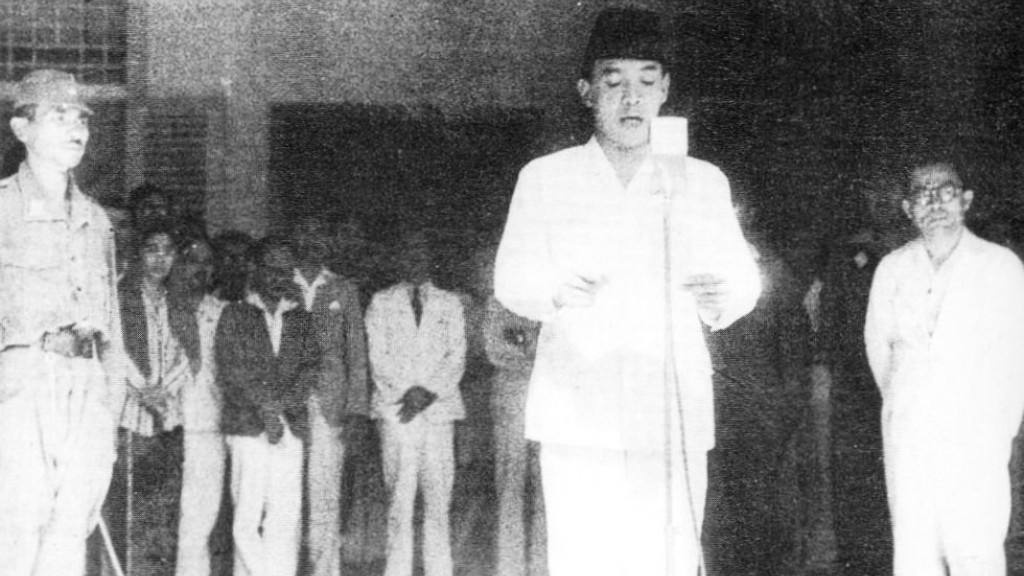"Revolution or Bersiap?" Negotiating social debates and language shift in archives
In the project Polyvocal Interpretations of Contested Colonial Heritage (PICCH), we investigate what audiovisual archives do with media produced in colonial contexts. As a postdoctoral researcher on this project, the recent controversy around the term "bersiap" caught my interest. What would I find connected to this term in the Sound & Vision archive? How does this word in the archive interact with current debates on its meaning and usage today?
In the project Polyvocal Interpretations of Contested Colonial Heritage (PICCH), we investigate what audiovisual archives do with media produced in colonial contexts. As a postdoctoral researcher on this project, the recent controversy around the term "bersiap" caught my interest. What would I find connected to this term in the Sound & Vision archive? How does this word in the archive interact with current debates on its meaning and usage today?

Sukarno declares Indonesian independence on 17 August 1945. Public domain via Wikimedia Commons
"Bersiap" refers to a period at the beginning of the Indonesian Revolution after the declaration of Indonesian independence on 17 August 1945. In January 2022, Bonnie Triyana, a guest curator of the upcoming "Revolusi" exhibit at the Rijksmuseum, explained that the term is problematic because it conjures racialized images of violence committed specifically by young Indonesian men. Instead, Triyana and others argue, it is important to understand this period and its events in the broader violent context of colonialism, World War II, and Indonesia's four-year struggle for independence. Triyana's piece was met with backlash from the Dutch Indo-European community and from the Rijksmuseum. (Here radio program OVT covers the controversy.)
The issue of changing language is of interest to PICCH's investigations of the colonial archive. Over time, certain widely used terms become outdated, often due to societal reexamination of their connections to particular ideologies. One way to deal with this in the archive is by using a thesaurus that links historical and contemporary terms. Searching a term like "bersiap" in the archive demonstrates how a controversial word traces a historical story about its own meaning, told in media and in metadata

Mural celebrating the 40th anniversary of Indonesian independence, Jakarta. Photo: Henk van Rinsum, 1985. Collection Nationaal Museum van Wereldculturen, CC BY 4.0 via Wikimedia Commons
"Bersiap" in the archive
Searching "bersiap" in the Sound & Vision archive shows some aspects of its development and meaning over the last half-century. In the earliest results—first-hand footage and propaganda from the war, dated 1945-50—"bersiap" does not appear in media itself, but as a metadata tag later added by the archive. Only in the 1980s, during a period of wide reexamination of the war in Dutch society, does the term begin to appear in media, often paired with archival footage and eyewitness interviews.
In the 2000s, the term appears more frequently, connected to a growing interest in Dutch Indo-European identity. Dutch people born in the colonial East Indies and their descendants appear in interviews and on genealogy programs as they trace their roots back to Indonesia. Historians, novelists, and documentary makers discuss Indo-European experiences, histories, and cultural inheritances. In these contexts, "bersiap" seems to comprise a focal point in a history of identity, emphasizing how Indo-Europeans in the mid-twentieth century were rejected both by Indonesia (by being the targets of deadly violence) and the Netherlands (by finding themselves the targets of anti-Asian racism once they escaped Indonesia and made their way back to the metropole). Only in one interview, with the historian Herman Bussemaker (‘OVT,’ 2005), are the murky origins of the term “bersiap” discussed; and only very recently is the term at all problematized. A 2018 episode of the history TV show ‘Andere Tijden’ asks: “Revolution or Bersiap? These are two terms for the same time.”
By searching the term “bersiap” in the Sound & Vision archive, we can see a glimpse of the term’s development especially in connection with Dutch Indo-European identity and how this is entangled with media objects. Perhaps through these historical documents we can better understand how the term, and the contestation of it, are sensitive topics tied to different perspectives on identity and history: simultaneously, the term holds racializing connotations about Indonesians, and also signifies an important historical break with Indonesia in Indo-European identity. We can identify the fuel of historical significance that lies ready to be added to the fire of a fiery social debate.
Metadata thesauri and beyond
How can cultural heritage institutions like Sound & Vision negotiate such debates and support users in their own investigations of complicated and contested histories? While perhaps, as one letter to the NRC about "bersiap" reads, “a [historical] fact cannot be racist,” language and images can certainly be racializing and can influence the way we frame and understand the factual events of history in their causes and effects. The debate over "bersiap" highlights why the curation of audiovisual media archives, attention to changing language, and the use of tools such as thesauri are all both very important and potentially quite sensitive. Beyond tools like thesauri, it is crucial for heritage institutions to facilitate access for user groups with different perspectives on history and to offer them the possibility to critique and contribute to metadata classifications. Certainly, in this case, an Indonesian researcher would have different terminologies for searching this history compared to someone with a Dutch or Indo-European perspective. A metadata thesaurus is one small tool in a much broader challenge for heritage institutions to weigh and balance many different perspectives on contested histories.
Emily Hansell Clark is a postdoctoral researcher at the Vrije Universiteit Amsterdam, appointed to the project Polyvocal Interpretations of Contested Colonial Heritage (PICCH). An ethnomusicologist by training, her research interests include music and sound, migration, and Dutch colonial history.